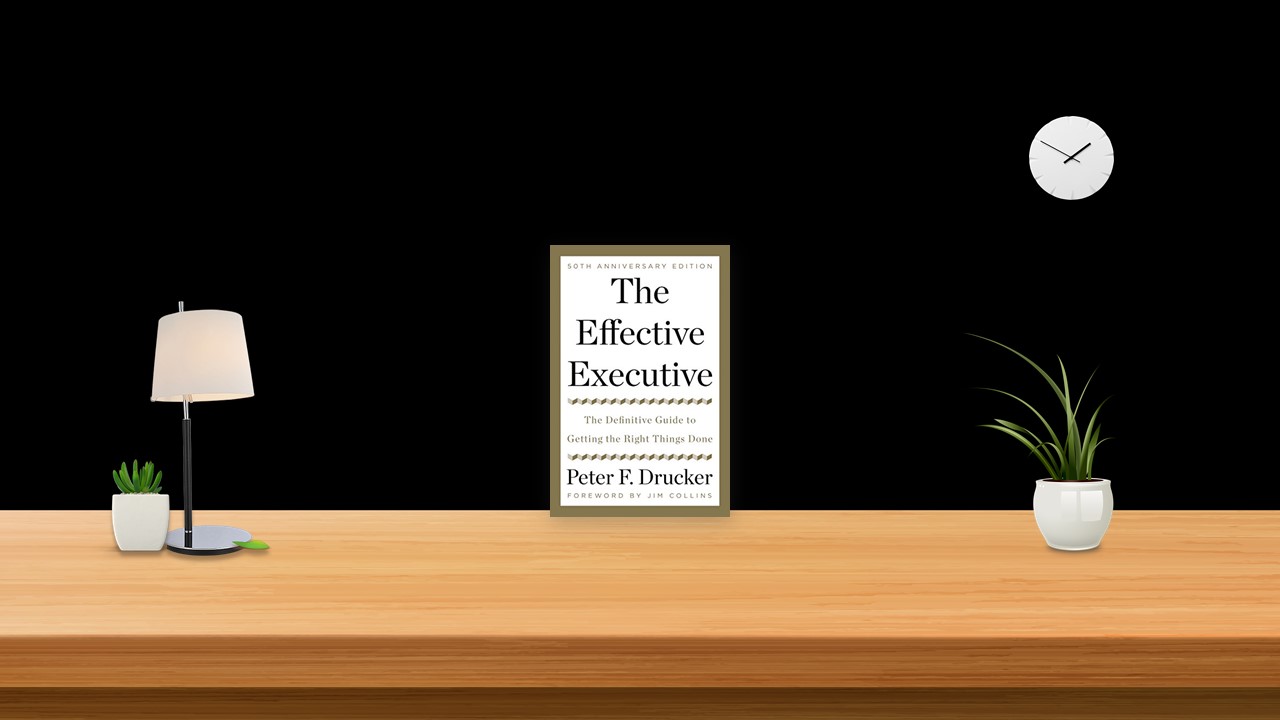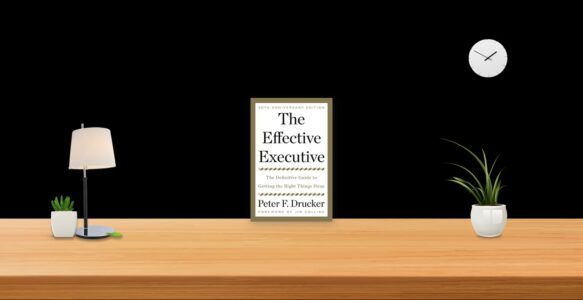Effectiveness Can Be Learned
Effectiveness is a habit; that is, a complex of practices. And practices can always be learned. Practices are simple, deceptively so; even a seven-year-old has no difficulty in understanding a practice. But practices are always exceedingly hard to do well.
These are essentially five such practices—five such habits of the mind that have to be acquired to be an effective executive:
- Effective executives know where their time goes. They work systematically at managing the little of their time that can be brought under their control.
- Effective executives focus on outward contribution. They gear their efforts to results rather than to work. They start out with the question, “What results are expected of me?” rather than with the work to be done, let alone with its techniques and tools.
- Effective executives build on strengths—their own strengths, the strengths of their superiors, colleagues, and subordinates; and on the strengths in the situation, that is, on what they can do. They do not build on weakness. They do not start out with the things they cannot do.
- Effective executives concentrate on the few major areas where superior performance will produce outstanding results. They force themselves to set priorities and stay with their priority decisions. They know that they have no choice but to do first things first—and second things not at all. The alternative is to get nothing done.
- Effective executives, finally, make effective decisions. They know that this is, above all, a matter of system—of the right steps in the right sequence. They know that an effective decision is always a judgment based on “dissenting opinions” rather than on “consensus on the facts.” And they know that to make many decisions fast means to make the wrong decisions. What is needed are few, but fundamental, decisions. What is needed is the right strategy rather than razzle-dazzle tactics.
#1 Know Thy Time
Effective executives start out by estimating how much discretionary time they can realistically call their own. Then they set aside continuous time in the appropriate amount. And if they find later that other matters encroach on this reserve, they scrutinize their record again and get rid of some more time demands from less than fully productive activities. They know that, as has been said before, one rarely overprunes.
And all effective executives control their time management perpetually. They not only keep a continuing log and analyze it periodically. They set themselves deadlines for the important activities, based on their judgment of their discretionary time.
Time is the scarcest resource, and unless it is managed, nothing else can be managed. The analysis of one’s time, moreover, is the one easily accessible and yet systematic way to analyze one’s work and to think through what really matters in it.
“Know Thyself,” the old prescription for wisdom, is almost impossibly difficult for mortal men. But everyone can follow the injunction “Know Thy Time” if he wants to, and be well on the road toward contribution and effectiveness.
#2 What Can I Contribute?
The focus on contribution counteracts one of the basic problems of the executive: the confusion and chaos of events and their failure to indicate by themselves which is meaningful and which is merely “noise.” The focus on contribution imposes an organizing principle. It imposes relevance on events.
Focusing on contribution turns one of the inherent weaknesses of the executive’s situation—his dependence on other people, his being within the organization—into a source of strength. It creates a team.
Finally, focusing on contribution fights the temptation to stay within the organization. It leads the executive—especially the top-level man—to lift his eyes from the inside of efforts, work, and relationships, to the outside; that is, to the results of the organization. It makes him try hard to have direct contact with the outside—whether markets and customers, patients in a community, or the various “publics” which are the outside of a government agency.
To focus on contribution is to focus on effectiveness.
#3 Making Strength Productive
In every area of effectiveness within an organization, one feeds the opportunities and starves the problems. Nowhere is this more important than in respect to people. The effective executive looks upon people including himself as an opportunity. He knows that only strength produces results. Weakness only produces headaches—and the absence of weakness produces nothing
He knows, moreover, that the standard of any human group is set by the performance of the leaders. And he, therefore, never allows leadership performance to be based on anything but true strength.
In human affairs, the distance between the leaders and the average is a constant. If leadership performance is high, the average will go up. The effective executive knows that it is easier to raise the performance of one leader than it is to raise the performance of a whole mass. He therefore makes sure that he puts into the leadership position, into the standard-setting, the performance-making position, the man who has the strength to do the outstanding, the pace-setting job. This always requires focus on the one strength of a man and dismissal of weaknesses as irrelevant unless they hamper the full deployment of the available strength.
#4 First Things First
There are always more productive tasks for tomorrow than there is time to do them and more opportunities than there are capable people to take care of them—not to mention the always abundant problems and crises.
A decision therefore has to be made as to which tasks deserve priority and which are of less importance. The only question is which will make the decision—the executive or the pressures. But somehow the tasks will be adjusted to the available time and the opportunities will become available only to the extent to which capable people are around to take charge of them.
If the pressures rather than the executive are allowed to make the decision, the important tasks will predictably be sacrificed. Typically, there will then be no time for the most time-consuming part of any task, the conversion of decision into action. No task is completed until it has become part of organizational action and behavior. This almost always means that no task is completed unless other people have taken it on as their own, have accepted new ways of doing old things or the necessity for doing something new, and have otherwise made the executive’s “completed” project their own daily routine. If this is slighted because there is no time, then all the work and effort have been for nothing. Yet this is the invariable result of the executive’s failure to concentrate and to impose priorities.
#5 Effective Decisions
The sooner operating managers learn to make decisions as genuine judgments on risk and uncertainty, the sooner we will overcome one of the basic weaknesses of large organization—the absence of any training and testing for the decision-making top positions. As long as we can handle the events on the operating level by adaptation rather than by thinking, by “feel” rather than by knowledge and analysis, operating people—in government, in the military, or in business—will be untrained, untried, and untested when, as top executives, they are first confronted with strategic decisions.
The computer will, of course, no more make decision-makers out of clerks than the slide rule makes a mathematician out of a high school student. But the computer will force us to make an early distinction between the clerk and the potential decision-maker. And it will permit the latter—may indeed force him—to learn purposeful, effective decision-making. For unless someone does this, and does it well, the computer cannot compute.
There is indeed ample reason why the appearance of the computer has sparked interest in decision-making. But the reason is not that the computer will “take over” the decision. The reason is that with the computer’s taking over computation, people all the way down the line in the organization will
Effectiveness Must Be Learned
The manual worker, so at least the nineteenth century believed, had only economic goals and was content with economic rewards. That, as the “human relations” school demonstrated, was far from the whole truth. It certainly ceased to be true the moment pay went above the subsistence level.
The knowledge worker demands economic rewards too. Their absence is a deterrent. But their presence is not enough. He needs opportunity, he needs achievement, he needs fulfillment, he needs values. Only by making himself an effective executive can the knowledge worker obtain these satisfactions. Only executive effectiveness can enable this society to harmonize its two needs: the needs of organization to obtain from the individual the contribution it needs, and the need of the individual to have organization serve as his tool for the accomplishment of his purposes. Effectiveness must be learned.


